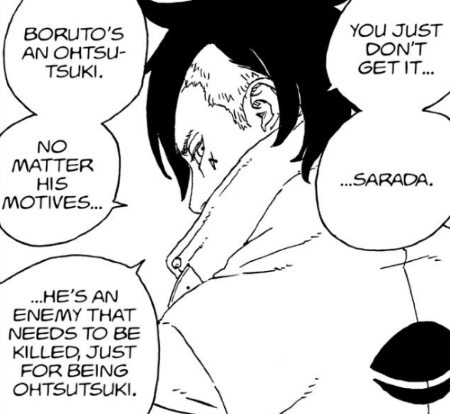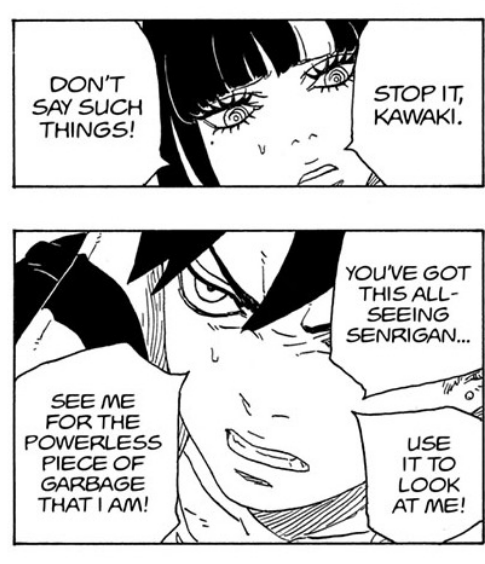Dehumanization and the Psychology of Kawaki
The Tragic Path Created by Kawaki's Past

The Boruto series often revisits themes introduced in Naruto, returning to them with an altered perspective to examine aspects previously unexplored. In the first arc of Naruto, we learned that the prevailing ideology toward shinobi, an entire class of citizens within the villages, was that they were tools meant to serve rather than individuals. Throughout Naruto, we learn of the systemic effects of the shinobi system and its intersection with the personal: love, family, friendship, and ideals.
When we're introduced to the new generation, we see that Naruto's promise to reform the shinobi world has indeed changed the lives of younger ninja, freeing them from dehumanization. They protect the village and one another because they want to, pursuing their own values of friendship and family while also being shinobi. This also leads to conflict, Naruto's own perspective of his son shifting to that of seeing him as a child rather than taking him seriously as a shinobi.
Though the shinobi system itself has changed, the abuses and wrongs committed by sentient beings against others still remain as we learn when the character of Kawaki is introduced. While the other members of the new generation whose parents were shinobi experienced their own familial hardships as most children do, Kawaki experienced dehumanization and abuse, first at the hands of his father, then from the members of Kara as he became their vessel, intended to resurrect Isshiki Otsutsuki and fulfill their desires.
Whereas the shinobi system exploited all shinobi, Kawaki was dehumanized as an individual, mocked for being empty, being useless, being nothing without the powers others bestow upon him. After being brought to Konoha, whenever a member of Kara violates the safety he was promised there, they reassert his status as subhuman, mocking his wellbeing, his displays of emotion, his kinship with others. Throughout these clashes, Kawaki learns time and again that it's not his bonds that keep him safe, but his own willingness to exploit and injure himself for the safety of others, which reaffirms to him that his value is that of a weapon, a tool, meant to serve the purpose of protecting Naruto, and then be discarded.
If Naruto was a boy who overcame all the bad that the villagers said about him, believing and embodying the the good words of those who cared for him, Kawaki is the opposite, a boy who discards the praise of others, believing himself to be nothing more than a monster, a belief he extends to Boruto's life as well. Naruto is an epic tale of a character defying his fate while Kawaki is a more accurate representation of the systemic damage dehumanization and abuse can do to a person's psychology.
According to Dehumanization and Mental Health: Clinical Implications and Future Directions:
"Meta-dehumanization, the perception that oneself or one’s identity is perceived as less than human by other people, is oftentimes a result of personal attributes or membership to a respective social group... Self-dehumanization may arise from the internalization of these meta-perceptions, interpersonal interactions, or the inherent nature of certain mental health conditions (Jenkins et al)."
When we look back at Kawaki's past, we see that alongside the long term physical abuse he sustains at the hands of his father, Jigen, and Code, his very humanity is attacked, undermining his perceptions of self. We see this in how he responds to Naruto telling him that he's a kind-hearted person and Eida disagreeing with his belief that no one would care about him if he died.

By the beginning of Boruto: Two Blue Vortex (TBV), Kawaki has become so steeped in the belief that he is nothing but a weapon to protect Naruto, to rid the world of Otsutsuki, Shinju, Code, and Boruto through any means necessary. He embraces his own badness, caring only for what he perceives to be righteous, no matter the cost it exacts upon others.
While being dehumanized results in higher levels of aggression and a higher likelihood of resorting to violence, it also lowers the level of empathy of its victims, leading to them dehumanizing others as well. This is what we see with Kawaki's character: his perception of self has been altered to see himself as less than human, and he extends this view to Boruto as well, who he includes in a category he's created for himself, a human whose Otsutsuki DNA defines them rather than individuals who deserves to live despite the genetic code of their biology. Though Kawaki loves Boruto, according to Eida, and sees him as a brother, we have witnessed his shift in only seeing the badness he perceives within him. As we see in TBV, Kawaki has begun framing Boruto's actions as malintent, inferring he's only come to Konoha to cause trouble, asking of the Shinju who are attacking the village are his friends. The cognition with which he views Boruto has changed to align with his belief that he lacks humanity.
Where Boruto becomes an especially nuanced narrative is that the plot provides us with reasons why Kawaki should view Boruto's life as one that's a danger to Naruto and the world. Momoshiki exists inside Boruto, waiting for the opportunity to take over his body, feed Kawaki to the Ten-Tails, and destroy the world in order to sample some especially tasty fruit. As long as Momoshiki is inside of Boruto, his life is an existential threat to the entire planet.
While we, as readers, might understand this nuance, and it's possible from plot hints that Boruto believes it himself, Kawaki centers his malice toward Boruto on the idea that he's Otsutsuki, just as Kawaki himself is Otsutsuki. Though Kawaki asks about the status of Momoshiki during their bro-to-bro catch up on Hokage Rock, it's not clear that the absence of his presence inside Boruto would change his mind about killing Boruto. He believes Otsutsuki are the root of suffering in this world, and he includes both himself and Boruto as members of their species.
The conflict between brothers in Naruto was on a set path, the main character endlessly pursuing his errant friend with the goal of bringing him back to the village. There was a possibility for resolution between them, a hand always extended in an offer of return, of redemption, of friendship. Just as so often in real life, the path forward for Kawaki and Boruto isn't so clean. Simply accepting Boruto's humanity wouldn't solve the problem of Momoshiki, and perhaps Kawaki can't accept his humanity because recognizing him to be the brother he bonded with, the brother he already killed once, would cause him too much pain. Thus, he's walled off his perception of Boruto as he knew him, relegating him to the category of worthless Otsutsuki along with Kawaki himself.
While we can be thankful that in our world, good people aren't harboring evil aliens, there are mental health circumstances in which good people can commit awful acts. Through a fictional universe, Boruto is offering us two different paths, one from Kawaki's perspective who sees the bad in Boruto despite his good acts, and one from Boruto's perspective who sees the good in Kawaki despite of his bad acts. Through their respective backgrounds, Kawaki's years of abuse and Boruto's stable family, we explore how family and life events shape our view of the world around us, the ways we were hurt causing hurt to others, the way we were loved allowing us to show love to others. However, while our perception of the world can be altered by our experience , we're not necessarily fated to act in one way because of our pasts. The "only possible outcome" that Boruto references in the opening scene of the series is their inevitable clash, the resolution of which is still yet unwritten.
Hey, thanks for reading this blog! Subscribe for updates and my weekly newsletter. But, more importantly, remember what we've learned about dehumanizing others. Proceed in this world with empathy, love, and recognition of our shared humanity.
